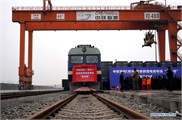SOURCE / INDUSTRIES
Cross-border e-commerce feels the pinch due to coronavirus outbreak

Thousands of Spanish customers visit AliExpress Plaza, the first brick-and-mortar store opened by online marketplace AliExpress in Madrid. Photo: Courtesy of AliExpress
When Yang Xiaoqiang was busy raising donations during the Spring Festival holidays for Wuhan in Central China's Hubei Province, where has been hit hardest by the coronavirus, he found his own cross-border e-commerce business hit the snag.
A backlog of 30,000 overseas orders could not be shipped in time since the outbreak of the coronavirus in late January, which severely disrupted normal flow of goods.
Based in East China's Zhejiang Province, Yang is a seller on cross-border e-commerce platform AliExpress, one of the largest business-to-customer (B2C) platforms run by Alibaba. His fashion-related goods are exported to Russia, the US and some European countries.
"Both my staff and I could not get back to Zhejiang at that moment due to restricted transport and we were under huge pressure if our foreign partners cancelled the orders," Yang told the Global Times.
Such phenomena in overseas markets such as canceling orders, refusing to sign on a delivery from China, and purposefully avoiding made-in-China goods were reflected by some Chinese sellers on cross-border e-commerce platforms including AliExpress and Amazon when the coronavirus was spreading quickly in China about seven weeks ago.
China's e-commerce platform Jollychic, popular in the Middle East with the download rate of its app exceeding 80 percent, told the Global Times that a few consumers in the Middle East expressed concerns over delivery from China. "But we quickly communicated with them and dispelled their concerns, telling them the virus could not spread via commerce while local government also conducted scientific guidance."
According to the WHO, people receiving deliveries from China are not at risk of catching the novel coronavirus, which does not survive long on objects, such as letters or packages.
Meanwhile, domestic manufacturing businesses that were shut down for weeks are now on the track of recovery and have also weighed on the cross-border e-commerce business.
Zhang Zhouping, director of cross-border business at the China E-commerce Association, told the Global Times that severely disrupted supply chain and logistics are two main factors curtailing the normal operation of cross-border e-commerce business. "Some retailers have prepared adequate inventory to sustain the virus assault, but for most medium-sized and small businesses, they were ill prepared."
Now, China has basically controlled the spread of coronavirus, and the whole country has been back on track of normal business, which has alleviated the pressure on the supply side, Zhang said.
Chinese mainland has reported zero new suspected infections of COVID-19 for the past four days, the first time since the outbreak, and now the major focus has shifted toward prevention of imported cases, the National Health Commission of China said in a press conference on Wednesday.
"However, full recovery of capacity still needs time," Zhang added.
The protruding problem at the moment has become logistics, which is crucial for the cross-border e-commerce business.
"Earlier, it was domestic logistics that had been largely affected by the virus and now the scope has been expanding worldwide," said Zhang.
Albert Shen, co-founder and CEO of the Beyond app, a cross-border e-commerce platform under Silicon-based start-up BorderX Lab Inc, told the Global Times that during the coronavirus outbreak, airlines cut their transport capacity, making logistics costs soar by nearly seven times.
New dilemma
As the coronavirus is spreading quickly with confirmed infection cases globally soaring to over 150,000 cases, the shift has posed another dilemma for cross-border e-commerce players.
The severe epidemic situation overseas has, to a large extent, impacted the normal operation of domestic cross-border e-commerce business, said Li Xinghui, secretary general of Hangzhou Cross-border E-commerce Association.
Li told the Global Times that the epidemic will weigh on consumer's purchasing power and willingness, which is likely to become reluctant to place orders online, and will affect the business of Chinese cross-border e-commerce players.
The seller Yang said that page visits for his products online have dropped by 40 to 50 percent in recent days. "One of my peers who sells women's bags have suffered a plummet of 60 percent in terms of online traffic."
"Less traffic means a smaller ratio than usual online browsing that would turn to real purchases, so we are feeling the pinch," said Yang.
Another change from the consumption side is that more people pay attention to health-related products, Li noted, like the face masks, sanitizers and goggles.
Data from AliExpress showed that the number of visitors for masks in Italy has surged 1,227 percent on the platform in the past two weeks, followed by Spain with 277 percent. The two countries are hit hard by the virus with the total confirmed infection cases well over half that of Europe.
Yang added that the inconvenient logistics and delivery services have also cast a shadow over the business operations.
"The post office has begun refusing to take our parcels for the Italian market and the European country has shut down its border, making terminal delivery quite hard," Yang noted.
The Italian government put the country on lockdown on March 10 in an attempt to stop the spread of the virus. The restrictions will run until April 3.
An array of countries around the world have lately adopted sweeping measures to stem the spread of the coronavirus, including shutting down airports, imposing travel restrictions and shutting down their borders.
For some cross-border e-commerce players who have established an overseas warehouse - referring to storage facilities established overseas where they can export goods in batches, they might find less hassle by disrupted shipping and logistics.
Miu Jiaxing, the brand representative of the Chinese smart car electronics provider 70mai, told the Global Times that during the three-day super-brand activity on AliExpress from February 17-19, the firm gained revenues of $790,000, beating the record of last year's Black Friday sales spree, "which was mostly attributed to preparations by our overseas warehouse in advance."
However, as the coronavirus spreads globally and health-related products become more needed, overseas warehouse resources are prioritized to provide for those products. "Now our electronics goods cannot enter Amazon," Miu said.
According to a notice by Amazon on Tuesday, the platform will only accept shipments of daily necessities, medical supplies and cleaning equipment from its suppliers at its warehouses to fulfill surging demand. The limitation will run until April 5.
Despite the virus' negative impacts on the cross-border e-commerce business, it also meant an opportunity for the sector to explore overseas markets, experts said.
"Offline consumption is mature in developed markets such as the US and Europe where the e-commerce business doesn't have a very high penetration, but the virus crisis is forcefully changing people's consumption habits by diverting some traffic online," said Li, adding that it is also an opportunity to cultivate those markets.
Shen of the Beyond app said the epidemic has clearly reflected the trend that the world is getting more integrated where cross-border e-commerce services are playing a more essential role. "And those platforms that can survive will only become stronger," Shen said.




